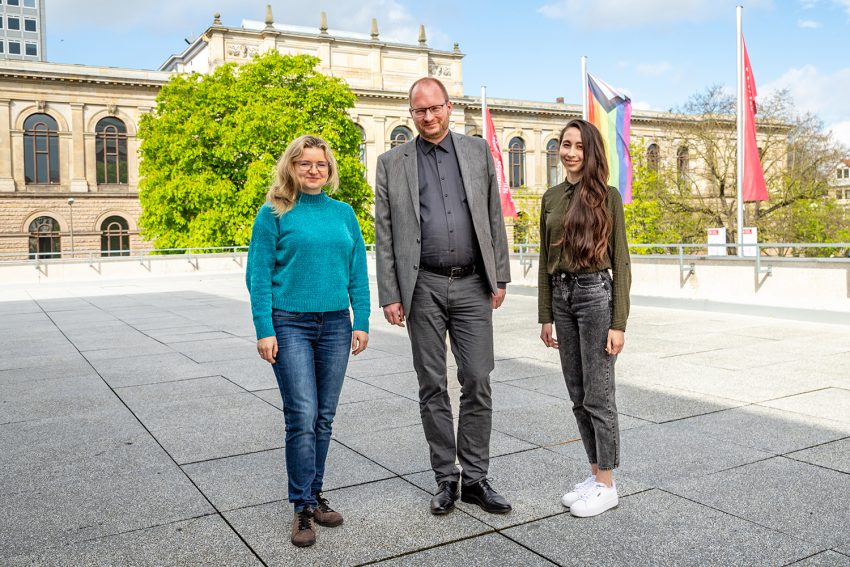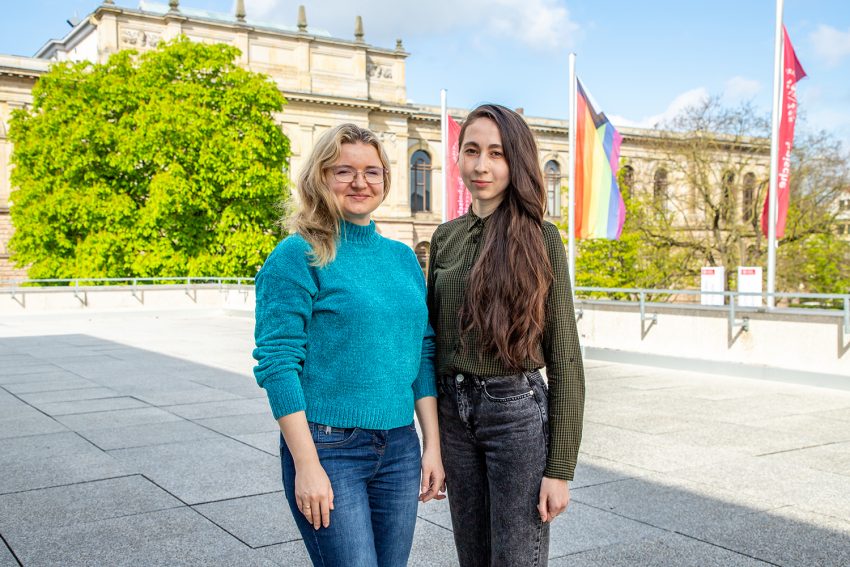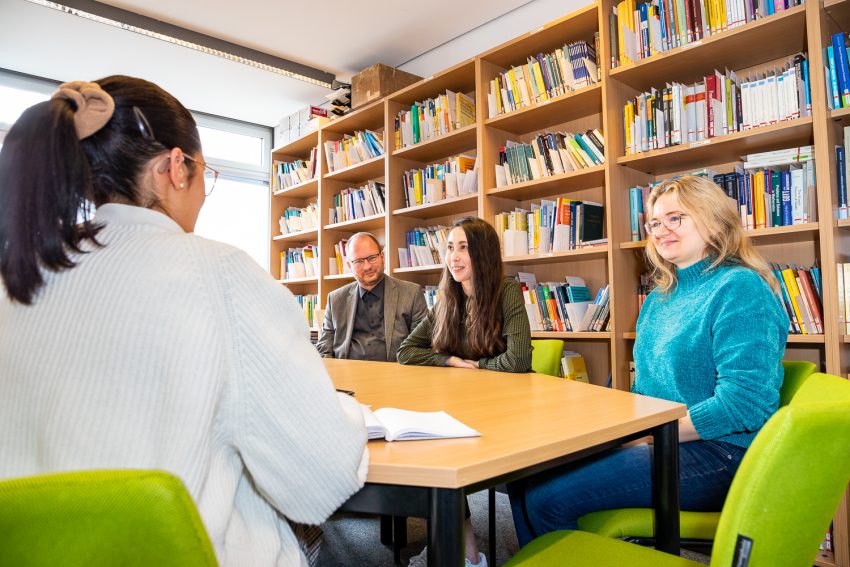An opportunity for both sides Two Ukrainian scientists enrich the mathematical dialogue
The two Ukrainian scientists are visiting TU Braunschweig for the second time on a fellowship from the Volkswagen Foundation. With their expertise, they enrich the research of the Institute for Partial Differential Equations and the university. For Dr Mariia Savchenko, her stay is extended by a further 15 months. She has been accepted for one of the 124 MSCA4Ukraine fellowships from the EU.
Since April 1st, the two mathematicians Dr Olesia Zavarzina and Dr Mariia Savchenko have been researching in the team of Prof. Dirk Langemann, the head of the Institute for Partial Differential Equations. As part of the project “From Modelling and Analysis to Approximation”, which has been funded by the Volkswagen Foundation since 2016, they are continuing their research at TU Braunschweig, taking advantage of the many opportunities for cooperation and contributing to the scientific discourse. The project, with the participation of the University of Lübeck and the Humboldt University Berlin, was originally intended to enable Ukrainian, Russian and German colleagues to exchange ideas in a trilateral partnership. Now it is a Ukrainian-German cooperation.

Prof. Dirk Langemann, Head of the Institute for Partial Differential Equations, with the two fellowship holders Dr Olesia Zavarzina (l.) and Dr Mariia Savchenko (r.). Photo credit: Kristina Rottig/TU Braunschweig
Dr Olesia Zavarzina researches and teaches at the V. N. Karazin Kharkiv National University, where she completed both her studies and her doctorate. She became aware of TU Braunschweig through a colleague who was taking part in a cooperation between the two universities. “She suggested I work on this project, which made me very happy,” says Zavarzina. Last autumn, she came to TU Braunschweig for the first time for two months.
Dr Mariia Savchenko does research at the Institute of Applied Mathematics and Mechanics at the Academy of Sciences of Ukraine. This is also her second time at Prof. Dirk Langemann’s institute. “Last year I was here for three months on a fellowship from the Volkswagen Foundation. There I also met Prof. Langemann, and he became my academic mentor for the European Union’s MSCA4Ukraine programme.” Prof. Dirk Langemann supported the scientist during her first stay in autumn 2022 in applying for the European Union’s MSCA4Ukraine fellowship programme for refugee researchers from Ukraine. She was recently accepted for a 15-month full fellowship and can thus extend her visit to TU Braunschweig. In her research, she describes the flow through porous media with nonlinear partial differential equations.
Fellowships as door openers for new perspectives
Prof. Dirk Langemann sees it as a great success and opportunity to work together with academics from international institutions within the framework of fellowships. New perspectives arise from the exchange, and it is a great honour to receive these fellowships. “Mathematics takes place in dialogue and communication. It is not a science done in one’s own little chamber, but in a scientific community,” he says. Especially the acceptance for the MSCA4Ukraine fellowship is not only a success for Ms Savchenko, but also for TU Braunschweig, he says.
The two researchers also see their fellowships as an opportunity. Dr Olesia Zavarzina and Dr Mariia Savchenko agree: participation in a fellowship programme is a great support for Ukrainian scientists. They report on financial cuts, reductions in hours in their home countries and how much it means to them to have the opportunity to open up new research areas through their fellowships.

Dr Olesia Zavarzina and Dr Mariia Savchenko see their fellowships as an opportunity. The two researchers agree that participating in a fellowship programme is a great support for Ukrainian researchers. Photo credit: Kristina Rottig/TU Braunschweig
Of war and security
Dr Olesia Zavarzina remembers the massive bombardments and explosions in the war zone, in which V. N. Karazin Kharkiv National University was also damaged. “We had big problems with the power supply and the heating system, so we couldn’t work properly at home either. Living in a city that is regularly bombed is very stressful. Here in Braunschweig it is very different. We have everything we need here for a normal life and for our scientific work. But above all, we are safe here,” she says. Dr Mariia Savchenko sees things similarly and is happy about the good working and living conditions. In Ukraine, after several moves of her institute, she only worked from her home office. After the last move, there were only two offices for the institute. “We can come to work at the university here, have a workplace there and can exchange ideas directly with colleagues,” she explains.
Braunschweig as a place to feel at home
Dr Olesia Zavarzina and Dr Mariia Savchenko already feel at home in Braunschweig; the city centre in particular reminds Savchenko of Lviv in western Ukraine. Both experience Braunschweig as a quiet and cosy city with many interesting places to discover. “There are many beautiful buildings here and it is pleasant to live here,” Zavarzina tells us. For Dr Mariia Savchenko, the short distances are another advantage of the city.

Prof. Dirk Langemann, Dr Mariia Savchenko and Dr Olesia Zavarzina talking about their visit to TU Braunschweig. Photo credit: Kristina Rottig/TU Braunschweig
Dr Mariia Savchenko is already looking forward to the next 15 months at TU Braunschweig as part of her MSCA4Ukraine fellowship. For Dr Olesia Zavarzina, too, this will not be her last stay. She is looking forward to further opportunities to do research at TU Braunschweig in the future. However, both researchers are particularly looking forward to returning to Ukraine to support their country in its reconstruction. We wish both scientists continued success and look forward to further visits to our university!
